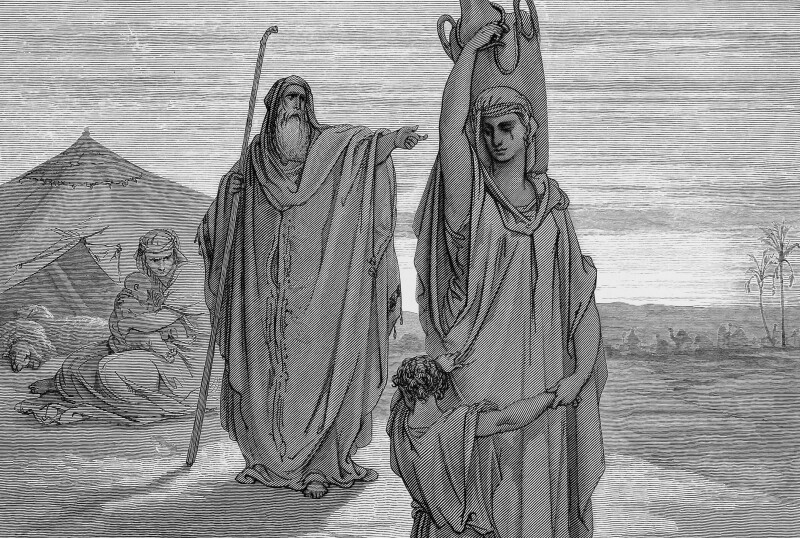As we look forward to studying the Old Testament in 2022, it’s important to remember that the premortal Jesus Christ was the God of the ancient Israelites.1 In my studies through Hebrew University of Jerusalem and as a former seminary and institute teacher, I have found greater understanding of the Old Testament by studying the original Hebrew and various English translations of biblical text.
One way to discover new insights about Jesus Christ’s character and mission is to study His various names and titles in the scriptures, many of which came from individuals who had experienced His influence in their lives. Here are five names of Christ—some of which you may never have heard before—from the Old Testament that remind me He is real, approachable, and unfailingly compassionate.
“The God Who Sees Me” (Hebrew: el ro’i)
She gave this name to the Lord who spoke to her: ‘You are the God who sees me,’ for she said, ‘I have now seen the One who sees me.’
In Genesis, we learn of an Egyptian handmaid named Hagar, whom the barren Sarah gave to her husband, Abraham. Hagar was to build up seed to Abraham and Sarah, but when she conceived, it stirred up tension between the two women, and Hagar fled into the desert.

Hagar ranked among society’s most invisible: servant, foreigner, female, runaway. It’s doubtful she expected to find help while wandering that desolate wasteland, feeling desperately alone, misunderstood, mistreated, and afraid.
Right at this grim moment, when Hagar must’ve felt utterly unseen, Abraham’s God manifested Himself2 and explained that He’d heard her cries. The astonished handmaid—no longer invisible!—gave Him the name “the God who sees me.”3
He then promised Hagar that if she would return to Abraham and Sarah, she would be blessed with innumerable posterity. The God Who Sees was giving Hagar sight: She could now see that He was there and had a plan for her life, which gave her hope and courage. She trusted and obeyed His word, and the Lord kept His promise.
Jesus Christ is a personal God who sees and understands each of us.
When you don’t feel seen, He sees you. When you're broken, He sees you. When you don’t think you’re worth being seen, He sees you. When you don’t like where you’ve come from and don’t know where you’re going, He sees you.
Because He sees, He can guide and lift you, opening your eyes to your promises and blessings. “The God who sees” sees you.
“Shadow” and “Shade” (Hebrew: tsel)
For thou hast been a strength to the poor, a strength to the needy in his distress, a refuge from the storm, a shadow from the heat, when the blast of the terrible ones is as a storm against the wall.
Ancient Israelites were familiar with scorching desert temperatures and found some degree of respite in the shade of trees, tents, or even clouds. Isaiah may have had this type of relief in mind when he called the Lord “a shadow from the heat.”4

“Heat” may be symbolic of the fiery demands of justice that you and I are unequipped to handle. It could also symbolize anything beating down on us: trials, temptations, persecution, loneliness, expectations, depression, anxiety.
Like an umbrella, the Savior’s sacrifice on our behalf places Him between us and each challenge we face. Consequently, He has the power to absorb the brunt of each trial’s intensity and to temporarily eclipse its source—whether the trial is the result of our own poor choices, others’ actions, health, finances, death, fear, and so on—casting a much-needed spiritual shadow over us that provides relief. While Christ, like shade, doesn't usually eliminate the burning rays in our lives, He alleviates it and rejuvenates us so we can keep going.
The Lord is your keeper; the Lord is your shade on your right hand.
Similar to a shadow, one psalmist considered the Lord to be “your shade on your right hand,”5 which can also be translated as “protection” or “defense.” In ancient warfare, the right hand wielded the weapon while the left hand held the shield, leaving the right side exposed to the enemy’s blows.6
► You may also like: 4 Hebrew translations that help us see the Savior more clearly in the Book of Mormon
This emphasizes the critical influence the Savior has as our protector. We are warriors fighting desperately for the cause of truth, wielding heavy swords and shields. But no warrior can protect all sides at once—there are always exposed, vulnerable areas, and Satan seeks to attack our spiritual Achilles’ heels.
But hope is not lost! We can invoke the protection of the great Lord of Hosts to overshadow us and deflect danger. As our shade, Christ is our defense and our hope.
“Nail” (Hebrew: yated)
And I will fasten him as a nail in a sure place; and he shall be for a glorious throne to his father’s house.
The future Savior was prophesied to be a “nail in a sure place.”7
Ancient Near Eastern dwelling places were simple. Instead of cupboards and closets, people used pegs to hold cooking utensils, supplies, and clothing off the dirt floor and away from bugs and rodents. These pegs had to be sturdy and reliable.
If the house was made of stone instead of wood, fastening such pegs would’ve been challenging. Some have asserted that metal rods were molded into the soft mortar during a house’s construction process, acting as reinforcement for the home’s structure and protruding from the wall to serve as permanent hooks or nails8 —a stable place where things could hang securely.

Appropriately, these reinforced rods, or nails, symbolize Jesus Christ, the immovable source upon which “shall hang … all the glory of his father’s house, [including] the offspring.”9 In other words, He has been given charge to uphold all of the Father’s glory and blessings, as well as His children. How does He do this? By taking from each of us our bill of debt then paying it by “nailing it to his cross.”10
Christ is the only completely reliable support11 on which we can hang our faith and salvation because all earthly things and people will eventually falter or fail. When it comes to eternal potential, the Savior—and only He—“is able to keep you from falling.”12
“Our Lord Jesus is as a nail in a sure place,” concluded one theologian, because “that soul cannot perish, nor that concern fall to the ground, which is by faith hung upon Christ.”13
“Jealous” (Hebrew: qanna’)
For thou shalt worship no other god: for the Lord, whose name is Jealous, is a jealous God.
Since jealousy carries such negative connotations in our culture, this self-description seems incompatible with the Lord’s perfection. It’s helpful to understand, though, that the Hebrew word can also mean “zealous.” Additionally, despite its current usage as “envious,” English lexicons include positive definitions of the word jealous. Two of these are particularly revealing:
- “Fiercely protective or vigilant of one’s rights or possessions.”14
- “Very concerned about protecting or keeping something.”15
Using those definitions, the verse could be understood this way: “Thou shalt worship no other god: for the Lord, whose name is [Fiercely Protective], is a … God [who is very concerned about protecting and keeping us].” Could His righteous jealousy be a reflection of love and compassion instead of harsh anger?
“Jealousy” in scripture often appears in the metaphor of a covenant marriage relationship between the Lord (a wholly devoted husband) and His people (a disinterested or unfaithful wife).16 The Lord is intolerant of our disloyalty—He won’t surrender without resistance—because it keeps us from important blessings He desires for us, including closeness with Him and the ultimate gift of eternal life.
This divine displeasure isn’t self-seeking, as mortal jealousies are; it is nothing but benevolent and is motivated by compassion. He wants us to choose Him over all other things because He’s fiercely protective of us and our eternal happiness; He knows that no other source can provide lasting peace or joy. He is zealous to bless us in every way we will let Him.
“Jehovah” (Hebrew: yhvh)
This covenant name-title appears nearly 7,000 times in the Hebrew Bible, though in the King James Version it appears as “Lord” in all but four instances.17 It’s a familiar name, but its meaning may not be.
The Hebrew word for Jehovah is a verb meaning “He is” or “He causes.” The first definition, of course, is important by helping us recognize that He is: He has, does, and always will exist. But in considering the second definition, what does He cause?
As the Supreme Creator,18 everything on this earth came by His word and hand. He calls into existence that which does not yet exist.19 Christine Hayes, the Sterling Professor of Religious Studies in Classical Judaica at Yale University, explained that “this God is one who brings things into being, whether it’s a cosmos from chaos, or … a new nation [Israel] from a band of runaway slaves [in Egypt].”20
For Latter-day Saints, there is further significance in the phrase “He causes.” Consider this statement by Andrew Skinner, a former dean of religious education at Brigham Young University:
“Yahweh is thought to be a causative form … meaning literally, ‘He will cause to be.’ Thus the phrase Yahweh Elohim (translated as Lord God…) would mean, literally, ‘He will cause gods to be.’” Unsurprisingly, Skinner said, this interpretation is “extremely controversial in many theological circles,” yet it is “precisely what we believe some of the ancient [scriptural] texts … were meant to convey when originally composed.”21
Jehovah’s very name suggests His crucial role, through the Creation and His Atonement, in facilitating God’s plan for His children to obtain exaltation and become like Him.

Coming to Know Christ
My passion for the scriptures is rooted in their ability to help me know Christ on a deeper level, which grows my faith so I can better follow and trust Him. They open my eyes to see Him not only as the Savior of the world,22 but also as “my Jesus,”23 who knows and loves me, personally. Of all the Savior’s names and titles, which one best represents your feelings about Him?
Notes
- See “The Living Christ: The Testimony of the Apostles,” ChurchofJesusChrist.org.
- The titles “The Messenger/Angel of the Lord” (malakh YHWH) and “of God” (malakh elohim) appear frequently in the Hebrew Bible. Unlike other messengers or angels, the messenger who visits Hagar refers to himself as the Lord God in the first person (see, for example, Genesis 22:11–15; 31:11; Exodus 3:2–4; Numbers 22:22–38; Judges 13:19). In this story, “the angel of the Lord” appears to Hagar, yet she tells “the Lord that spake unto her,” using the second person, “Thou God seest me” (Genesis 1613 [KJV], emphasis added). Elsewhere we commonly refer to the angel of the Lord as being Jehovah, such as when the wandering Israelites were led by a pillar of fire (Exodus 14:9). In Zechariah 3:4, the messenger takes away the sin of the high priest, something only the Son of God has power to do. Many of the earliest Christian theologians (as early as the first century AD) taught that the angel of the Lord was God Himself (see Pope, Catholic Encyclopedia [1907]). The angel of the Lord might be a specific angel sent to speak on behalf of the Son or the Father, but in Christianity it is often held that it is the unembodied spirit of the Son communicating the will of the Father.
- Genesis 16:13 (NIV).
- Isaiah 25:4.
- Psalm 121:5 (ESV).
- Spence and Exell, Pulpit Commentary, vol. 8.
- Isaiah 22:23.
- See Benson Commentary and Barnes’ Notes on the Bible.
- Isaiah 22:23–24.
- Colossians 2:14.
- See 2 Nephi 22:20; Mosiah 3:17; Alma 38:9.
- Jude 1:24.
- Henry, Concise Commentary.
- Oxford English Dictionary.
- Merriam-Webster.
- See, for example, Jeremiah 3; Lamentations 1:1–7; Ezekiel 16:14–63; Hosea 2:27.
- “Jehovah” appears in the King James Version in the following four verses: Exodus 6:3; Psalm 83:18; Isaiah 12:2; 26:4. It also is used three times in compound place names: Genesis 22:14 (Jehovahjireh, “God will provide”), Exodus 17:15 (Jehovahnissi, “the Lord is my banner”), and Judges 6:24 (Jehovahshalom, “the Lord is peace”). Shortened variations are found in numerous personal names, such as Elijah (jah, “my god is Jehovah”) and Joshua (yeho, “Jehovah is salvation”).
- Alma 30:44.
- See Romans 4:17 (GR).
- Open Yale Courses, RLST 145, Lect. 7.
- Skinner, To Become like God (2016). For an excerpt of the chapter about Jehovah, visit ldsliving.com/the-astonishing-meaning-behind-this-sacred-name-for-god-how-it-supports-lds-doctrine/s/85743.
- Doctrine and Covenants 43:34.
- 2 Nephi 33:6.


